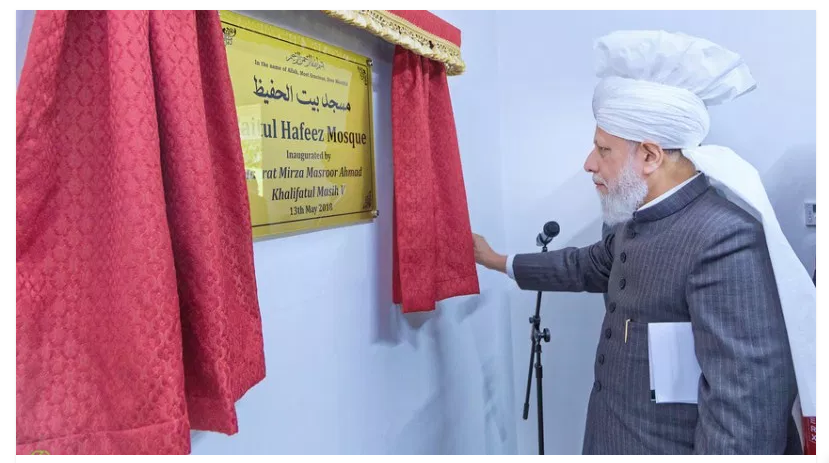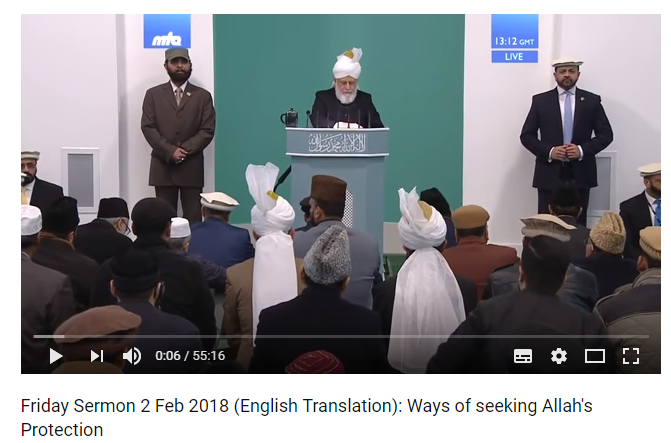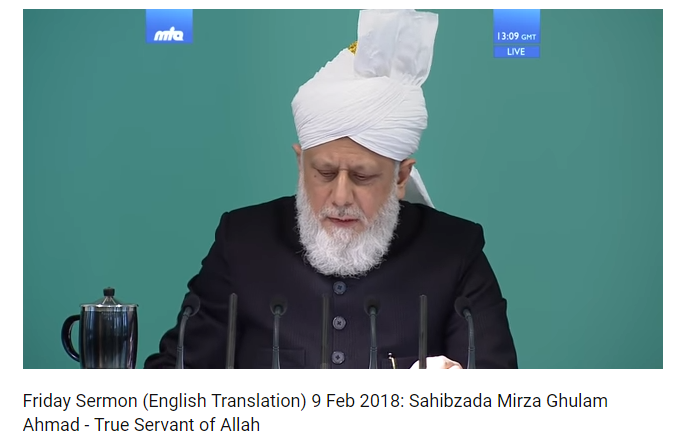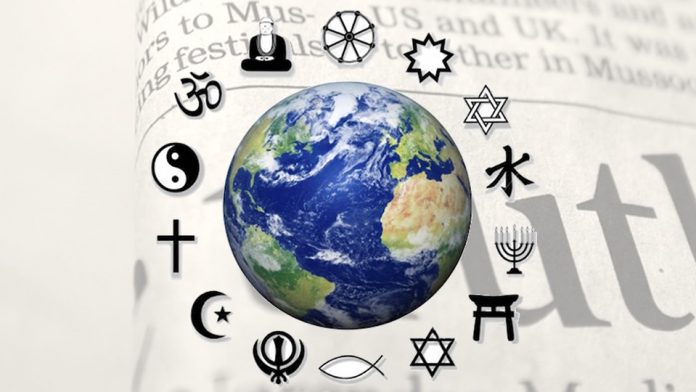BY ALH. M. M. GIWA
Imam Sulaiman a.k.a. Mario Joseph claimed the Holy Quran converted him to Christianity in a video that is viral in the social media online. The video contained half truths, misrepresentations and lies about Jesus in the Holy Quran, Islam and the Holy Prophet Muhammad among others.
Let me give a brief introduction of Mario Joseph from the video. He claimed his parents came from Turkey and settled in India in the South Kereland. He said he was working in a Masjid (Mosque) as an Imam (as a parish priest). According to him, somebody from his congregationasked: Who is Jesus? And He then decided to go and read the Holy Quran from cover to cover to really know who Jesus was. And so that was how the Quran converted him to Christianity as a result of his findings about Jesus Christ from the Holy Quran.
Now to the points raised by Mario Joseph. I would try my best to answer the points raised point by point where possible.
- a) Firstly, he claimed, the Quran contained 6666 verses. This is not correct. The Quran contains 6236 verses. This speaks volume, how a former Imam of a Mosque could not know the actual number of verses in the Quran.
- b) Secondly, he said the Quran gave preference to Jesus over Muhammad. It is not so. He said Muhammad was mentioned 4 times by name and Jesus 25 times. That was his reason for the above conclusion. The fact of the matter is that the Quran was revealed to Muhammad. Muhammad was with his people. They knew about his childhood and adulthood, so the Quran does not need to tell us about this. The Holy Quran told us mostly about previous prophets of God and their people so that we could learn from them. The life and death of Christ was shrouded in mysteries and the Quran cleared these mysteries and that was why the name of Christ was mentioned 25 times. For instance, the name of Joseph was mentioned 27 times, Abraham 69 times and Moses 136 times in the Holy Quran. Did that make them superior to Jesus or Muhammad? I am sure, no Christian would be ready to accept that Joseph, Abraham and Moses are superior to Jesus. You could now see how mischievous and dishonest Mario Joseph was. (If we follow his yardstick, it means Joseph, Abraham and Moses are superior to Jesus).
I would like to itemize other points raised by Mario Joseph and try my level best to answer them point by point.
- c) Jesus was called Kalimatullah (or Word of God) in the Quran.
- d) Jesus was called Ruhullah (or Spirit of God)
- e) Jesus was called Isa Masih (or Jesus Christ)
- f) Jesus spoke in the cradle?
- g) Jesus created a life bird with mud?
- h) Jesus cured the night blind, leprous and gave life to the dead?
- i) Jesus went to Heaven;he is still alive and will come back according to Quran?
- j) Is Jesus Son of God or Slave of God?
- k) ‘If you have doubt concerning the Holy Quran, ask the people of Book’(Q10: 95).
- l) He said it is written in the Quran to fight and kill one who rejects Islam.
The Word of God andThe Spirit of God
I wonder why Mario Joseph and some Christians are confused about the ‘Word of God’ and ‘Spirit of God’. He said Jesus is the ‘Word of God’ and ‘Spirit of God’ according to the Quran and Muhammad is not. Let me be honest and frank with you and I am emphasizing this that all prophets of God and righteous people are all the ‘Words of God’ and ‘Spirits of God’. I, that I am addressing you, I am the ‘Word of God and the ‘Spirit of God’. Let me explain myself. God uses His word ‘Kunfayakun’ or ‘Be! and it is’ to decree whatever He desires to make. You see millions of couples cohabit for several years without issues. This is because God has not decreed that they should have children with His word ‘Kunfayakun’or ‘Be! and it is’. When over 60 years ago, my father cohabited with my mother and it resulted in my pregnancy, it was because God had decreed it with His word ‘Kunfayakun’. That is why I am the ‘Word of God’. And Almighty God decided later to breath His spirit into my embryo and I became the ‘Spirit of God’ (indicating that the soul now resides in my body). It is not something out of the ordinary. Even John, the Baptist was filled with the Holy Spirit (Spirit of God) from his mother’s womb (See Luke 1:15). This is not said about Christ in the Bible.
Is Jesus the Messiah (Christ) according to the Holy Quran?
Nobody is disputing the fact that Jesus is the Messiah. He is the anointed prophet sent to the Israelites during his dispensation. For the Holy Quran confirmed that Jesus is the Messiah (Isa Masih).See Q3:49. But one of the meanings of‘Messiah’ in Arabicis a person who travels a lot. For Jesus traversed a lot of distant lands in search of the lost 10 tribes of Israel to discharge his mission. Hence he is called the ‘travelling prophet’ (vide Kanzul-Ummal and pages 63 and 64 of Jesus in India by HazratMirzaGulam Ahmad).
Did Jesus speak in the cradle ?
The verse in reference is Q19:30 and it reads thus:
There upon she (Mary) pointed to him (Jesus). They (Elders of the Jews) said‘How can we talk to one who is a child in the cradle?’
Let me give you a little background to the story that led to the above verse. You see the Elders of the Jews accused Mary the mother of Jesus of committing adultery as a result of the virgin birth of Jesus. I would like to give the commentary of the above verse from the Holy Quran with English Translation and Short Commentary edited by Malik GhulamFarid (Published under the auspices of HazratMirzaTahir Ahmad, Fourth successor of the PromisedMessiah and Head of Ahmadiyya Movement in Islam) page 649. It goes thus:
“The words ‘she pointed to him’ indicate that Mary knew what answer Jesus would give if the Elders of the Jews addressed their questions to him. These words may also indicate that Mary knew that if she declared herself innocent nobody would believe her. The only evidence of her innocence was her son. She meant that such a holy and righteous son whom God had endowed with such noble qualities could not be the result of an immoral union that his virtues and good qualities by themselves constituted a sufficient vindication of her innocence. When Mary, on being taunted by the elders of the Jews, directed their attention to Jesus, they disdained to talk to Him and contemptuously said, how could they talk to ‘a child in the cradle’ meaning a mere boy, who was born and brought up before their very eyes? Elders of people are wont to talk like that when invited to learn wisdom from one who is much younger to them in age. The words merely constitute an expression of contempt and disdain for Jesus”.
If Jesus had actually spoken as an infant, history and the Bible would have recorded it, but they did not. The Bible only reported that Jesus spoke with wisdom and intelligence in his youth with teachers in the temple (vide Luke 2:46-48).
Did Jesus create a life bird from clay, heal the sick, the night blind, the leprous, and did he actuallygive life to the dead?
Before proceeding, I would like to mention that the Holy Quran,unlike the Bible (or other Religious Books), is meant for the pure of heart and those endowed with spiritual insight to grasp its true and deeper meaning. Now to the verse in question: Quran 3:50 goes thus:
“And will send him as a messenger to the children of Israel (to say) ‘I come to you with a sign from your Lord, which is, that I will fashion out for you a creation out of clay after the manner of a bird, then I will breathe into it a new spirit and it will become a soaring being by the command of Allah; and I will heal the night blind and the leprous, and I will quicken the dead, by the command of Allah, and….”
I would like to give the commentary of the above verse from the Holy Quran with the English Translation and Short Commentary edited by GhulamFarid and (Published under the auspices of HazratMirzaTahir Ahmad, Fourth successor to the Promised Messiah and Head of Ahmaddiya Movement in Islam) page 140.
It goes thus:“If Jesus had really created birds, there is to be no reason why the Bible should have omitted to mention this, particularly when the creation of birds was a miracle the like of which had never been shown before by any Messenger of God… The whole clause, ‘I will fashion out for you a creation… become a soaring being’ would mean that if ordinary men of humble origin but possessing the inherent capacity for growth and development came into contact with him and accept his message, they would undergo a complete transformation in their lives. From men groveling in the dust and not seeing beyond their material cares and mundane concerns, they would become converted into birds soaring high into the lofty regions of the spiritual firmament. And this is exactly what happened. The humble and despised fishermen of Galilee under the impact of the enabling precept and example of their master, began soaring high like birds, preaching to the world of Israel the word of God”.
“The prophets of God are spiritual physicians, they give eyes to those that have lost spiritual sight, and hearing to those who are spiritually deaf, and they restore to life, those who are spiritually dead (Matt. 13:15). In this case the word ‘Akmah’ (or night blind) would mean such a person as possesses the light of faith but being weak of resolve cannot stand trials… Similarly, the word ‘Abras’ (leprous) would, in the spiritual sense, mean one who is imperfect in faith, having particles of diseased skin among healthy ones.
The clause, ‘I will quicken the dead’, does not mean that Jesus actually brought the dead to life. Those actually dead are never restored to life in this world. Such a belief is diametrically opposed to the whole Quranic teaching (2:29; 23:100-101; 21:96; 39:59-60; 40:12; 45:27). The marvelous moral transformation that God’s messengers bring about in the lives of their followers is termed “raising the dead to life”, in spiritual terminology.
Christ said, he would only give a sign or miracle from the Bible.According to the Bible Mathew 12:39-41, Christ promised to only perform the miracle of Prophet Jonah and no other miracle.
Mathew 12:39-41 goes thus: “An evil and adulterous generation seeks for a sign; but no sign shall be given to it except the sign of the Prophet Jonah. For as Jonah was three days and three nights, in the belly of the whale, so will the son of man be three days and three nights in the heart of the earth.”
From the above quotation, Christ promised not to perform any miracle except the miracle of Prophet Jonah. In other words, all the purported miracles of Christ i.e. healing the sick, restoring the sight of the blind and raising the dead etc. did not take place. That is exactly what the above quotation means. Christ said he would only perform one miracle and that was the miracle of Prophet Jonah.
Was the Ascension (physical raising to heaven) of Jesus mentioned in the Holy Quran?
No. It was not. Mario Joseph claimed Jesus ascension was mentioned in the Quran. He quoted Q50:23. On checking, nothing like ascension was mentioned there. He must have misquoted it. He must be referring to Q3:56. It goes thus:
“O Jesus, I will cause you to die (a natural death) and will exalt you (your soul) to Myself….”
From the above quotation the death of Jesus comes first before exaltation to Allah and so where was Jesus physical raising up to heaven mentioned. Therefore there is nothing like Jesus ascension to Heaven in the Holy Quran. Besides, God is immaterial and has no fixed point. Where is the direction of God if I may ask?
Jesus Christ is Dead
If Jesus Christ is not in heaven, where is he?
According to the Holy Quran Jesus Christ is dead and is no more (1) See Quran 3:145. It goes thus
“Muhammad is only a messenger. Surely all messengers before him have all passed away (i.e. were all dead).
God did not say except Jesus or any other prophet for that matter. (2) See also Quran 5:117. It goes thus:
“And when Allah will say, ‘O Jesus son of Mary, did you say to men, ‘Take me and my mother for two gods besides Allah’. He will answer ‘Holy are you, I could never say that to which I had no right. If I had said it, you would have surely known it. You know what is in my mind and I know not what is in your mind. It is only you who are the knower of hidden things.
‘I said nothing to them except that which you did command me – Worship Allah, my Lord and your Lord and I was a witness over them as long as I remained among them, but since you did cause me to die, you have been the watcher over them and you are witness over all things”
The above Quranic verse proved the death of Jesus as well as that Jesus did not claim to be God. But Mario Joseph cleverly ignored this as well as Q3:45 stated above.
Even according to the Bible, Mathew 19:16-17, Jesus denied he was God: “One came and said to him, Good master, what good thing shall I do, that I may have eternal life? And Jesus said to him, why do you call me good? There is none that is good but one, that is God…” Here Jesus denied being God. He said he was not good. And that only God is good. Thus Jesus is only a humble prophet of God.
Jesus, Son of God or Slave of God according to the Quran?
Mario Joseph said according to the Quran,Muhammad and Muslims are slaves of God but that Jesus is son of God and has the power to turn Christians to children of God. Mario Joseph is being mischievous and dishonest. For it is clearly stated in the Holy Quran too that Jesus is a slave of God. See Quran 4:173.
‘Surely, the messiah (Jesus) will never disdain to be a slave of Allah nor will the angels near (unto God)’.
In other words, Jesus will never feel ashamed to be a slave of God, and the Angels who are near to Him. Mario Joseph knew this but pretended as if nothing like that existed in the Holy Quran. Therefore all human creatures of God including Jesus, Moses, and Muhammad are all slaves of God.
Is Muhammad in doubt about the Quran or Islam?
According to Mario Joseph, he said Quran 10:94 says ‘If Muhammad is in doubt about the Quran or his religion, he should ask those who have been reading the scriptures (i.e. Jews and Christians). No, it is not so. Mario Joseph and other Christians are reading the verse out of context. If you read the verse in context, you will understand it to mean, ‘if you (or any reader of the Quran) are in doubt about the Jewish scriptures, ask those who have been reading the scriptures. The passage is talking about Pharaoh, Moses and Israelites. How would Muhammad be in doubt when God has assured him in Quran 5:4 thus:
This day have I perfected your religion for you and completed my favour upon you and have chosen for you Islam (Peace) as your religion;
also Quran 3:86 proclaims thus:
‘And whoso seeks a religion other than Islam, it shall not be accepted from him, and in the hereafter he shall be among the losers’
Is it commandedin the Holy Quran to fight and kill one who rejects Islam?
According to Mario Joseph, the Quran said Muslims should kill one who rejects Islam and that was why his father tried to kill him when he converted to Christianity. This is far from the truth. There is no place in the Holy Quran where a Muslim is asked to kill a non-Muslim (whether he rejects Islam or not). Mario Joseph did not quote any verse of the Quran to support his view but Bible Thumpers usually quote Quran 2:192 (in part) ‘And kill them wherever you meet them…’ to support their false statement. But this is part of a sentence and is quoted out of context. Let’s examine Quran 2:191 and 192 for better understanding
‘And fight in the cause of Allah against those who fight against you, but do not transgress. Surely, Allah loves not the transgressors.
And kill them wherever you meet them and drive them out from where they have driven you out, for persecution is worse than killing….
‘And kill them’ from above refers to transgressors and not non-Muslims. And it refers to a war situation (battle field). In the battle field or war front, if you don’t kill your enemy, your enemy will surely kill you. And so, God commanded Prophet Muhammad to ensure freedom of worship so that persecution will be eliminated.
Furthermore, the Quran 2:257 says:
‘There should be no compulsion in religion. Surely, Truth is distinct from Falsehood’ to remove any doubt remaining.
Jesus did not die on the cross
From my above write-up, I mentioned that according to the Holy Quran, Jesus is dead. According to the Bible too, Jesus survived the crucifixion. He escaped and travelled to the Indian subcontinent in search of the 10 lost tribes of Israel, who had been enslaved by Nebucadnesa and taken to India where they settled. Christ met and preached amongst them. They accepted him and he died in their midst. (See Jesus in India by MirzaGulam Ahmad.Link Al-islam.org). Modern research has discovered the tomb of Jesus in Kanyar Street, Srinagar, Kashmir India. And so Christ is dead like other prophets of God and is no more. If you want to read more about Christ’s escape from the cross, his journey to India and pictures of his Tomb, see this link https//www.alislam.org/topics/Jesus.
My intention is not to prove the superiority of the Holy Prophet Muhammad over Jesus Christ in this rejoinder but I would like to quote 2 or 3 renowned Christian Historians expressing their views about Muhammad.
- a) Thomas Carlyle in Heroes and Hero worship and Heroic in History said ‘The lies which well-meaning zeal has heaped round this man (i.e. Muhammad) are disgraceful to ourselves only’. It is the same lies Mario Joseph is spreading round.
- b) Michael Harth in the 100 -Ranking of the Most Influential Persons in History, New York 1978said:
‘My choice of Muhammad to lead the list of world’s most influential persons in history may surprise some readers and may be questioned by others. But he was the only man in history who was supremely successful in both the secular and religious level. It is probable that the relative influence of Muhammad and Islam has been larger than the combined influence of Jesus Christ and Saint Paul in Christianity. It is this unparalleled combination of secular and religious influence which I feel entitle Muhammad to be considered the most influential single figure in human history’.
- c) Alphonso de La Martaine in Historic de la Tuque Paris 1854said ‘If greatness of purpose, smallness of means and astonishing result are the three criteria of a human genius, who could dare compare any great man in history with Muhammad?
Philosopher, Orator, Apostle, Legislator, Conqueror of ideas, Restorer of Rational beliefs.The Founder of twenty terrestrial empires and one spiritual empire. That is Muhammad. As regards all standards by which human greatness may be measured, we may well ask is there any man greater than he?’
No, indeed there is no man greater than him.
Mario Joseph claimed the Holy Quran converted him (from Islam) to Christianity. The Holy Quran was revealed to the Holy Prophet Muhammad but it did not convert him to Christianity. Rather Muhammad was able to convert hundreds of thousands of Christians to Islam before his demise and millions of Christians were converted to Islam by Muhammad’s followers after his demise and it is still ongoing. For Islam is said to be the World’s fastest growing religion, (vide http://edition.cnn.com/2017/03/16/world/Islam.fastestgrowing-religion/tmd/).
In the end, all praise is due to Allah, Lord, Cherisher and Sustainer of all the worlds.





















